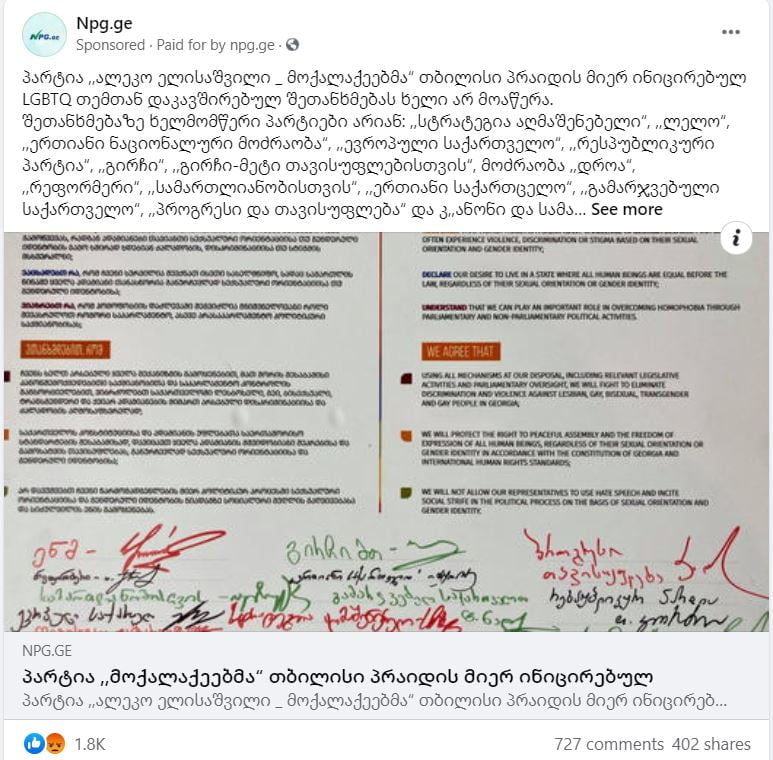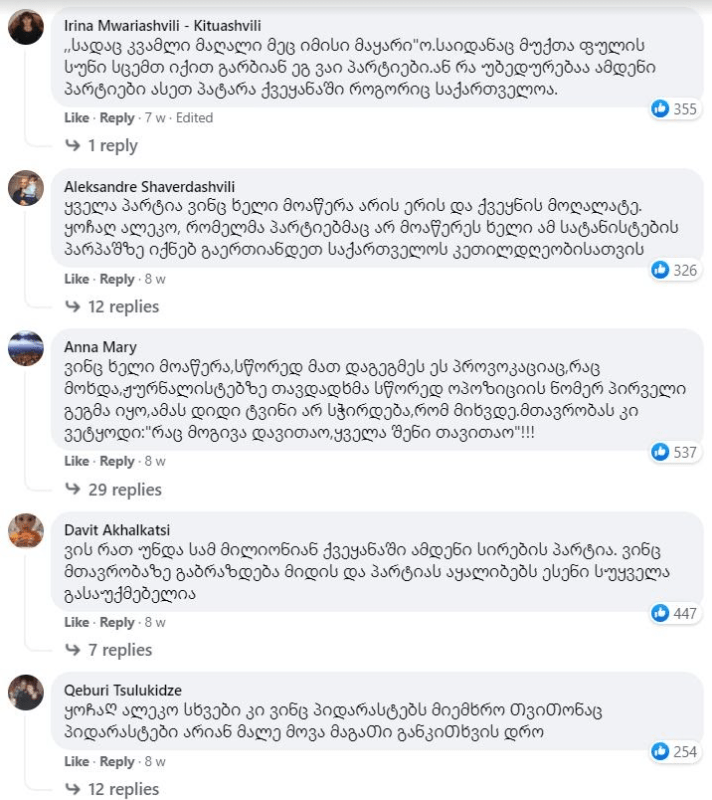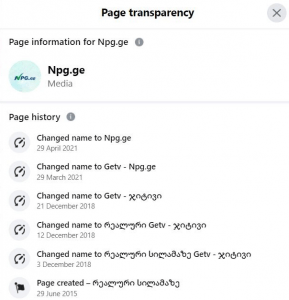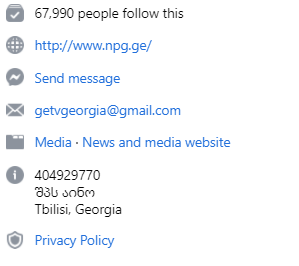‘True Beauty’ of Georgia’s Homophobic Election Campaigns
Facebook has long become a center of divisive and bitter political discussions in Georgia. Georgian netizens frequently find themselves facing the avalanche of sponsored stories with direct or indirect political messages popping up on their newsfeeds. This trend accelerates especially ahead of elections.
This is precisely how a post about Aleko Elisashvili – the Citizens, the parliamentary opposition party with the eponymous leader, found us:
“Party of Aleko Elisashvili – the Citizens did not sign the agreement about the LGBTQ community initiated by Tbilisi Pride,” reported the Facebook page of npg.ge, a website posing as an online news outlet, and also listed the opposition parties that did join the May 17 agreement pledging to eliminate discrimination and violence against LGBTQ citizens.
The news itself does not say much more, aside from the contents and purpose of the agreement.

Sponsored story about the Citizens party not signing the LGBTQ-supportive agreement, appearing on the newsfeed on September 5, 2021. By then, the post had generated over 1,800 reactions and over 700 comments, while more than 400 persons shared the post. 
Top comments on the post are mostly critical of parties that agreed to sign the document, with some users writing praise words “good job Aleko” for Aleko Elisashvili
Digging just a bit deeper, we found that the Facebook page of NPG has about 68 thousand followers and started running the ad on August 30. The page says it belongs to the Aino company, which, according to the business registry, is owned by Citizens party member, Ivane Norakidze. The page names have been evolving: it was founded in 2015 under the name “True Beauty,” but gradually acquired more media-related names. A significant portion of advertised posts is news stories about the leaders of the Citizens party.

Founded in 2015, the media page underwent multiple name changes, landing from “True Beauty” in 2015 to Npg.ge in 2021. 
The media page is registered with the company Aino ltd., owned by a member of the Citizens party as per business register
Norakidze, a lawyer by training and practice, responded to our query, saying he is not involved in managing the outlet. According to his story, he only helped his friends years ago to register the website with the company. Neither does the NPG agency have “direct links” with the party, said Norakidze, adding that the Citizens only “cooperate” with the outlet just as they would do any other media. Norakidze, who led the campaign HQ of Elisashvili during his Tbilisi Mayoral bid in 2017, promised that current administrators of the page would get in touch with us, but they have not contacted Civil.ge yet.
Yet, if we go to the Facebook ads library, the NPG’s strong focus on the Citizens party in the ads preferences is hard to ignore.
The story about Elisashvili not signing the queer-supportive agreement has been boosted twice – first on July 10 when it was published, days after the July 5 homophobic pogroms against planned Tbilisi Pride march and journalists, and then again on August 30, in the midst of the campaign ahead of the October 2 local elections.

From Avoidance to Deliberate Abuse
It is unclear what the advertised story tries to show: it may be just another attempt to portray the Citizens as a distinctive force from the rest of the opposition who struggle to free themselves from a spell of being associated with the United National Movement, the erstwhile ruling party. The Citizens were among the first to call for a parliamentary boycott on the night of the October 31 elections, but also one of the first to advocate ditching the boycott, thus striking the blow to opposition unity and alienating the larger opposition parties.
Giorgi Tabagari, Director of Tbilisi Pride which unites Georgian LGBTQ+ activists, recalled that he, too, came across a similar news item earlier. Noting that he does not know who is behind the ad, the activist asserted that the outdated sponsored story is clearly about “capitalizing on homophobic attitudes” in Georgia and is doing so for political gains.
Elisashvili has never been a champion of queer rights: after 15 opposition parties agreed to sign the queer-supportive memorandum, he was quoted in media as saying that he did not find it necessary to join: we already have anti-discrimination laws and the constitution “clearly” stating all the rights, he noted.
In days leading up to the July 5 events, he said it “would be very good if [LGBTQ activists] refrain” from holding the pride march, arguing it has no other consequences but to incite a wave of hate and contempt while energizing pro-Russian forces. The Pride did not take place on July 5 over safety concerns, but the violence involving a mob gathered in a homophobic rally still left dozens of media workers attacked or injured as they were trying to report.
But boosting non-queer-friendly news after the July 5 homophobic violence and then amid the campaign months later seems to go beyond the mere political instinct of avoiding angering potential voters. It is aimed at gaining votes by riding the wave of hate.

The 95% Spell
The controversial ad is not a single case of building the campaign on homophobia, as Georgia has recently seen more troubling examples from the ruling party that also refrained from signing the May 17 agreement. On September 4 Prime Minister Irakli Garibashvili came under fire from the civil society outfits over aiding violent homophobic attitudes through his campaign remarks. PM Garibashvili said the canceled July 5 pride served as the “gravest provocation” and “a conspiracy against our people” from the United National Movement, the ruling party’s nemesis.
Earlier, on July 12, the PM said that “95% of [Georgia’s] population are against holding a propagandistic parade in a demonstrative manner,“ adding that the government thus “shall obey” the public opinion. It is still not clear what survey Prime Minister’s assertion has been based on – according to the NDI opinion poll from July 2019, 27% of surveyed in Georgia said protecting the rights of sexual minorities was important or very important, jumping from 23% in 2018.
Later in July, CSOs raised alarms over the derogatory and homophobic posters all over Tbilisi featuring UNM leaders, along with the media personalities and civic and LGBTQ+ activists under a rainbow’s arch. The watchdogs feared that the ads opening the election campaign were a “call to violence.” The GD members denied they had anything to do with the posters.
“In general, the Georgian Dream launched its campaign with this topic,” said Tabagari. While the activist does not see LGBTQ+ issues to be a part of a “continuous,” daily campaign discourse, he said queer rights were absent from the campaign of bigger parties during parliamentary elections in 2020.
Aside from the campaign taking place in the aftermath of July events, the Tbilisi Pride activist suggested the key trigger this year may be the ruling party being “more morally bankrupt ahead of these elections,” making them choose homophobia, among others, in their discrediting attempts against the opposition.
As homophobic attitudes in Georgia run strong, seeing the democracy as a rule of majority without concern for the minorities remains a view that is shared widely, across the political spectrum. While there are some who don’t attack the minorities, they don’t go an extra mile to protect them either. This bodes ill for democracy.



